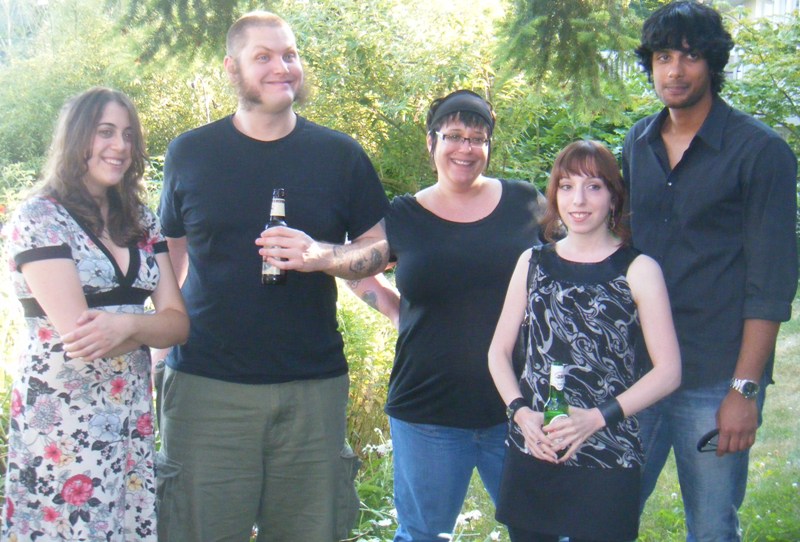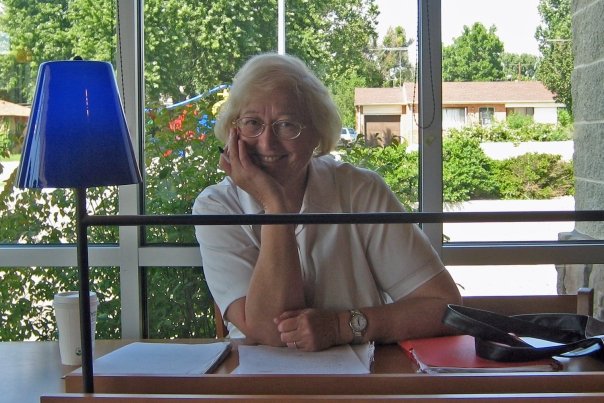This post is the sixth in a series of ten about my experiences at Clarion West Writers Workshop (Wikipedia) as a member of the 2008 class. I’ll talk about Week 4 of the workshop, when Connie Willis (Wikipedia) instructed. Here are Parts 1, 2, 3, 4, and 5 of the series. In Part 5 I discussed Cory Doctorow‘s week and ended with a somewhat bizarre dismantling of my psyche. This post is quite the opposite: I brag. Bear with!
“Total exhaustion is the goal,” Mary Rosenblum said, teaching Clarion West during our Week 2, and by Connie’s Week 4 I was totally exhausted; that’s clear to me now as I read over the emails I sent friends and family during that middle of July ’08. In those emails I also now detect a down-on-myself attitude about my fiction-writing, one that I don’t particularly experience anymore (knock on wood). These days I get dejected or grumpy about my fiction-writing at times, of course, but I don’t feel such negativity, pessimism, or bewilderment about the whole process. I have strong confidence in my abilities, and faith that new stories will turn out right eventually, that I’ll be able to revise them into artworks I’m proud of. That confidence is due in part to Wifely Kate, additional and diverse employment experiences, and other factors; but, a huge chunk of it has definitely come from Clarion West. This benefit from Clarion West took a long time to set in; I’ve had to incorporate what all I learned into my writing and my life, and that took me quite a while.
The additional confidence from Clarion West hasn’t derived so much from the grab-bag of tips I picked up from the instructors or my fellow students (though these have helped!), nor was it any sort of confirming validation that other Clarionites sometimes mention. I gained so much, I think, from the way a Clarion workshop primarily focuses on the process of revision, not creating an ultimate and spotless draft; and, second, making weird friends who accept me for my weirdness-es was an invaluable gift. As Kate puts it, I found my people, my tribe.

’08 Clarionites L to R: Kira Walsh, Carlton Mellick III, Caren Gussoff, Theresa DeLucci, Pritpaul Bains
About Clarion’s focus on revision — writing and life are pretty much driven by storytelling, or at least by motifs that recur and recur, carrying with them their old meanings and acquiring new ones as they go. I’ll have more to say about how this works when I get to my Week 6 post (the forthcoming Part 8), but for now, the emphasis on revision, the way instructors and fellow students took specific elements of stories and suggested specific changes (with reasons!), gave a real sense that one’s own fiction can work, after all, that the poor draft you wrote does indeed have potential in it. There’s a real feeling of hope there.
Which is why I shouldn’t have been so down on myself. My Week 4 short story was an unfortunately convoluted mystery. I came up with the story from absolute scratch — not even a vague idea of the story before the workshop — which was a specific challenge I’d set myself before arriving at the space station (the Workshop mysteriously floats in orbit over Seattle). In the emails, instead of feeling glad I about actually succeeding at this task I’d set myself, I was all down on how the story didn’t “work.” Well, pretty much no first draft ever works. And, no matter how bungled, the first draft had cool ideas. Why be so negative?
Connie told us it took her eight years of writing before she sold a story; she also asked each of us to tell the group how we started writing. The answers varied; some knew since birth, it seemed, and others were late bloomers. Me? I wanted to be a writer as a kindergartner, but soon switched my hoped-for career to astronaut; in middle school I made up stories often, but then switched to music. When for various reasons I determined a music career was not for me, I tried writing again, and after a few months, maybe even only after a full year, I began to enjoy it. I hope people reading this who are searching for their own directions, whether as a writer or otherwise, come to feel patient with their search. Often — and the psychologist Csíkszentmihályi (gloriously pronounced “Chick-sent-me-high”) makes this point — it can take learning time before you enjoy a career path. For many, beginning to play, for example, tennis (maybe at the behest of a friend) isn’t very fun: all those frustrating, misguided racket swings and terrible serves. But once you can get to where you can actually play not too shabbily, the fun and satisfaction finally starts setting in. If you give up on a career path without giving yourself time to get some basic proficiency, you probably haven’t really tried at all.

Picture stolen from Connie’s website
More about Connie. She’s a frequent master of ceremonies at science fiction & fantasy events, a respected dame in the field. She was one of the instructors who hung around our quarters of the space station in her spare time, answering questions and just visiting. Before I went to the Workshop, I read one book by each instructor; for her I selected Passage. The book was fast-paced and straightforwardly written — and also very moving. Highly recommended. She’s a real expert at plot.
Her advice mostly centered on plot, too. Here are some of her tips I collected; she gave the caveat that her advice was only her advice, that we should feel, like Agatha Christie, free to break any rules.
But I should note first that during Week 4 an anonymous friend sent me a replacement copy of Peter Straub‘s If You Could See Me Now; the copy I brought with me, oddly, was missing a page. I found it helpful to have a book with me that was totally unrelated to Clarion West. Really reading it was impossible, due to the total exhaustion, but being able to dip into a page here or there and disappear from the Workshop was refreshing.
Anyhow: tips from Connie Willis:
-
Connie’s definition of plot: “A constantly surprising chain of events with each new scene turning the story to a new point where the logical occurs, unforeseen by the reader.”
-
Unremitting horror exhausts readers. Use contrast!
-
The perfect title means one thing when you start the story, and by the end of the story, it means another. It should be evocative, it should add something to the story, and it should have both literal and figurative meaning(s).
-
PG Wodehouse claimed a 7500 word story needs two big reversals: one at 1500 words, one at 6000 words.
-
If some things in the story are complicated, make other things simple.
-
Develop a good filing system (for research and ideas, e.g.)!
-
Fix one aspect at a time when you revise.
-
When you read fiction or watch film, look for reversals, raising the stakes (“things get worse”), foreshadowing, climax, dénouement, interior conflict, exterior conflict. Study extensively the books you know well and admire.
Connie also gave us each a critique coupon to snail-mail her along with a short story or novel opening, if we wanted. Finally, a tidbit: in interviews she’s mentioned that when she was very young, she read the fiction section at her local library in alphabetical order. At the space station I asked her how far she made it through the alphabet. I believe her answer was H, that reading Heinlein made her switch to reading all the library’s science fiction.
As I’ve said throughout this series, writing these Clarion West posts induces in me a unique sort of stress that I don’t fully understand; I feel, maybe, as if I’m just not describing the time well enough, not at all portraying just how transformative and wonderful the Workshop was — that these posts are somehow doing violence to a great gestalt from a time that’s gradually starting to feel like long ago. Maybe that’s why I delay these posts: to hang on to my Clarion West experience.
One thing that continues on, however, are my classmates, our relationships. They’re all people I treasure; mostly we keep in touch, sometimes through our email list, sometimes with individual phone calls, even trips here and there.
One way or another, see y’all special Clarionites soon. ;-)


 Twitter:
Twitter:
4 comments ↓
Hi Douglas!
You wrote this a while ago, and I have been meaning to comment on it. I even starred it in my Google Reader, but somehow never got around to it. I guess that writing about CW stuff is hard for me, too! It does feel like the experience is over in some ways. Also, I think I still don’t really have enough perspective to make sweeping statements. I really love these recaps though and I hope you move ahead and do all of them. It’s nice to be reminded of things you remembered that I didn’t and also memories we share. Thanks, Douglas!!
I love reading these entries. We had such a special time together.
I truly hope you finish entries 7 – 10 :).
Douglas,
Like you were at the start of these illuminating posts, I too am staring down the long, cold barrels of waiting from that interstellar communication from Clarion. Your metaphor of a space station is so apt in the manner that it depicts the remoteness of such a vaunted establishment where the power of the writer’s Third Eye is helped to open and blaze with creative glory. I think impossible to imagine such an experience -a place! -being bound by simple things like gravity with so much will behind it.
Anyway, and not to wax poetic any farther than I already have, I wanted to thank you for posting these. Reading them was SUCH a relief in some ways as it…let the air out of the anxiety that’s been circling my head like a buzzard waiting for a meal. Living these experiences through your eyes and nostalgia humanized the process and reaffirmed my hope to have earned my way in with simple words and clever grammatical tricks.
Thank you very much and best wishes.
Benjamin Guinn
And perhaps if I learn to speak English as my primary language, and write without silly typos, they might consider me in a decade or more. :)
Please disregard this post, I was just looking at my last one and shuddering at the errors. Busy day and lack of attention = a recipe for a linguistic car crash.
Leave a Comment